|
|
|
Sort Order |
|
|
|
Items / Page
|
|
|
|
|
|
|
| Srl | Item |
| 1 |
ID:
102666
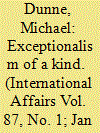

|
|
|
|
|
| Publication |
2011.
|
| Summary/Abstract |
The recent US mid-term elections have not only dented President Obama's image at home and abroad, they have seen the return to 'divided government' whereby one party controls the Executive and the other controls either the Senate or the House of Representatives or both. Such divided government has been quite frequent since the Second World War; but the situation is often portrayed by political scientists as dysfunctional, even as they acknowledge that the Founders of the Republic deliberately created a federal system which would minimize concentrations of political power. Yet divided government is only one complaint among many levelled by American commentators at their political system. This article examines such criticisms both theoretically and historically, and also develops a historical approach which discusses American attitudes to the past, particularly US foreign relations. Here the emphasis is upon the ideologies that have powered American expansion, first across the North American continent and then overseas. A peculiar, even 'exceptional' aspect of this expansion has been its rhetorical form, in particular the invocation of past presidents to justify contemporary actions and the creation of a doctrinal canon (classically expressed in the Monroe doctrine). While these two lines of enquiry (emphasizing history and political science) are the methodological double core of the article, they are not treated discretely; rather the focus is on the interplay between the two.
|
|
|
|
|
|
|
|
|
|
|
|
|
|
|
|
| 2 |
ID:
124749
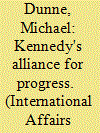

|
|
|
|
|
| Publication |
2013.
|
| Summary/Abstract |
One of the first acts of the new administration of President John F. Kennedy in 1961 was to promote an 'Alliance for Progress' throughout Latin America. JFK's stated goal was 'to transform the American continent' by improving the often desperate living conditions of its peoples; advancing industrialization; diversifying and increasing exports (especially away from heavy dependence on single items such as coffee); encouraging interstate trade and communications; and-above all-strengthening democracy: a term to inspire but one rarely, if ever, defined. The primary means for achieving these ends would be the extension of loans by the United States and others, thereby building up capital for industrial production while increasing food and raw material supplies to maximize foreign exchange-all with the aim of reversing the 'dependency' of 'underdeveloped' Latin America upon the more 'advanced' economies of the north Atlantic area. Kennedy's expressed fear was that Latin America, its impoverished peoples ripe for revolution, would follow the path of Cuba under the new regime of Fidel Castro. In the first part of a two-part analysis the historical and political origins of the Alliance are traced to both US and Latin American sources, including schemes within the Organization of American States and 'Operation Pan America'; in the second part the economic failures and the strategic successes of the Alliance during the presidencies of Kennedy, Lyndon B. Johnson and Richard M. Nixon will be evaluated as another, if varied, stage in the evolving 'hegemonic presumption' of the US towards its southern neighbours
|
|
|
|
|
|
|
|
|
|
|
|
|
|
|
|
| 3 |
ID:
145282
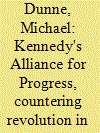

|
|
|
|
|
| Summary/Abstract |
Within weeks of his inauguration in January 1961, President John F. Kennedy proposed an Alliance for Progress: a $100 billion programme of economic, political and social development for Latin America. Its purpose was to tackle the causes presumed to have sparked the Cuban revolution, chiefly poverty and bad governance, and within half a year every Latin American state except Cuba committed to the goals of the Alliance. But within a few years even proponents of the Alliance doubted its efficacy, a pessimism which increased during the presidency of Lyndon Johnson, and more so under Richard Nixon. This review of the contemporary and historical literature on the Alliance sets that scholarship within the broader area of US–Latin American relations, with particular emphasis on US–Cuban relations from the 1960s until the twenty-first century. An important sub-theme is the peculiarity, the ‘exceptionalness’ of American political rhetoric, derived from and in turn shaping Americans’ sense of the history and the foreign relations of the US: the ‘American mission’ to the world.
|
|
|
|
|
|
|
|
|
|
|
|
|
|
|
|
| 4 |
ID:
107210
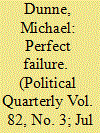

|
|
|
|
|
| Publication |
2011.
|
| Summary/Abstract |
In 1961 the US Central Intelligence Agency master-minded a sea-borne invasion by Cuban exiles aimed at overthrowing the regime headed by Fidel Castro. With minimal logistical support from the USA the attempted counter-coup launched at the Bay of Pigs was an unqualified disaster: a 'perfect failure', in the words of an authoritative contemporary. This essay locates the fiasco in the longer history of US-Cuban relations, concentrating on the Cold War years, the history of US political intervention and subversion in Latin America, and the dictatorship of Fulgencio Batista and the rise of Castro himself-both men offering different models of Latin American caudillismo (the power and cult of military strongmen). The essay concludes with an analysis of Cuba as an issue in US domestic politics and the impact of the Bay of Pigs in consolidating the Cuban revolution and setting the framework for the Cuban Missile Crisis of October 1962.
|
|
|
|
|
|
|
|
|
|
|
|
|
|
|
|
| 5 |
ID:
122488
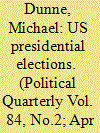

|
|
|
|
|
| Publication |
2013.
|
| Summary/Abstract |
The system for electing the President of the United States remains essentially as it was prescribed in the Federal Constitution drafted in 1787. The individual 50 states (plus the District of Columbia) are accorded a number of votes in the (so-called) Electoral College; each state's Electoral College vote is then attributed to the candidate gaining a plurality (most) of the popular vote in that state; and the candidate with a majority (50% + 1) of these aggregated Electoral College votes is declared the incoming president. What has changed have been the methods of nominating the candidates, chief of which are the political parties from the nineteenth century with their stage-managed quadrennial conventions and the primary/caucus campaigns from the twentieth century which precede and now determine the formal nomination. President Obama's 2012 re-election campaign showed both the crucial importance of the much-maligned Electoral College in winning the presidency and the demographic divisions hidden in the larger American political landscape.
|
|
|
|
|
|
|
|
|
|
|
|
|
|
|
|
|
|
|
|
|